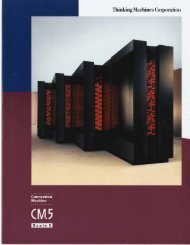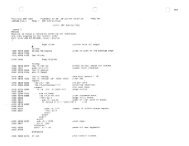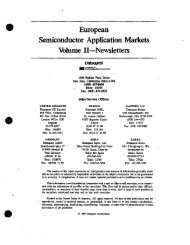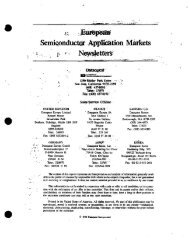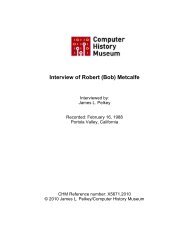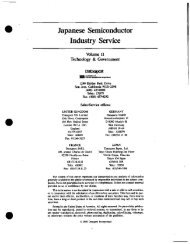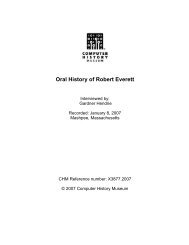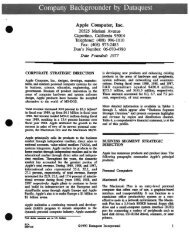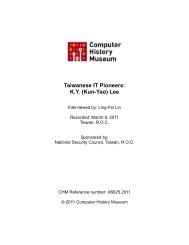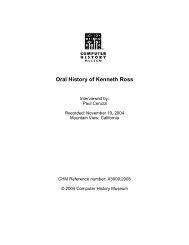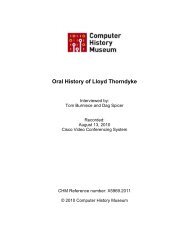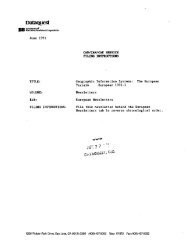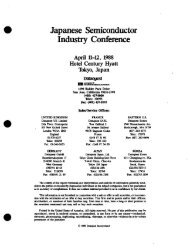Burroughs B2500/B3500, 1967
Burroughs B2500/B3500, 1967
Burroughs B2500/B3500, 1967
Create successful ePaper yourself
Turn your PDF publications into a flip-book with our unique Google optimized e-Paper software.
for conventional systems are eliminated by<br />
these automatic MCP operations.<br />
The MCP queues each program by priority<br />
and lists its equipment requirements as it<br />
is loaded. This program reference table is<br />
matched with a table reflecting the current<br />
status of each hardware component in the<br />
system and the highest priority program, with<br />
requirements matching the system's available<br />
resources, is initiated. This matching proce-<br />
dure is repeated each time there is a change<br />
in the system environment. The speed, detail<br />
and accuracy required for effective schedul-<br />
ing in a mukiprocessing environment would<br />
be impossible to handle manually, yet taxes<br />
little of the system's own power. It results in<br />
much higher system productivity by assur-<br />
ing more continuous use of each hardware<br />
component.<br />
The MCP maintains tables indicating the<br />
status of each I/O device as well as each I/O<br />
request being processed or awaiting an op-<br />
portunity to be processed. Each time an I/O<br />
operation is initiated or terminated, the MCP<br />
compares the two lists and attempts to initi-<br />
ate all possible I/O operations. As a result,<br />
the system's I/O devices are kept fully active<br />
as long as there is work for them to do.<br />
On an MCP controlled B 2500 or B 3500<br />
system, the operator puts tape files for sched-<br />
uled programs on any convenient tape unit.<br />
When the unit is activated, the MCP reads<br />
the file label, associates it with the unit, and<br />
thus is able to identify it when the program is<br />
initiated. The MCP also automatically assigns<br />
scratch tapes as needed. If a needed file or<br />
scratch tape is not mounted when the pro-<br />
gram is started, the MCP will advise the oper-<br />
ator and start the program as soon as the<br />
requirements are met. Files from random<br />
access disk storage are allocated space auto-<br />
matically by the MCP and accessed by symbolic<br />
relative addresses in the object program<br />
When a program is terminated, the MCP<br />
automatically closes all files as part of its<br />
routine housekeeping function.<br />
Files may consist of fixed or variable length<br />
records arranged in fixed or variable length<br />
blocks within core memory size limitations.<br />
The MCP automatically blocks and unblocks<br />
records according to specifications of the<br />
program.<br />
In a mu~tiprocessing environment it is quite<br />
possible for several programs to require<br />
printer output simultaneously. The MCP han-<br />
dles this situation by diverting printer output<br />
to a scratch tape while the printer is busy and<br />
then reading the tape-captured data back to<br />
the printer when it is free. This allows process-<br />
ing to continue on programs which would<br />
otherwise have been suspended awaiting<br />
printer availability.<br />
At load time the MCP automatically reserves<br />
and loads all disk file and core memory space<br />
necessary for each program, its associated<br />
data, and its 1/0 buffers. The MCP takes<br />
advantage of base relative addressing to<br />
c'fl~at"programs and data in memory to opti-<br />
mize the use of available core space. When a<br />
program is terminated, the MCP immediately<br />
carries out all housekeeping necessary to<br />
make memory space available to the next pro-<br />
gram and may relocate programs currently<br />
in memory to prevent "checkerboarding" and<br />
further maximize space availability.<br />
Compiler and Assembler programs may be<br />
segmented to allow most of the program to<br />
remain in disk storage during execution until<br />
needed in core memory. The MCP automatically<br />
handles overlay routines, shuttling<br />
program segments from disk to core memory.<br />
This technique allows extremely large pro-<br />
grams to be run on systems with modest core<br />
memory size, reduces core storage require-<br />
ments for multiprocessing, and lowers overall<br />
system cost without sacrificing performance.



